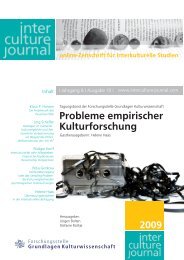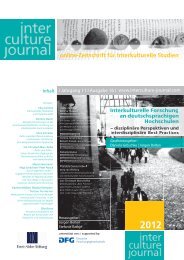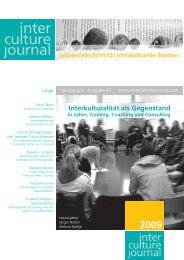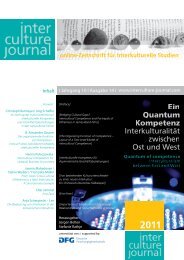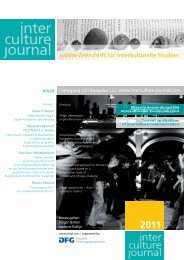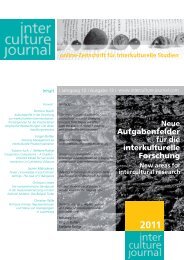Interkulturellen Kompetenz forschung - Frankfurt School of Finance ...
Interkulturellen Kompetenz forschung - Frankfurt School of Finance ...
Interkulturellen Kompetenz forschung - Frankfurt School of Finance ...
Erfolgreiche ePaper selbst erstellen
Machen Sie aus Ihren PDF Publikationen ein blätterbares Flipbook mit unserer einzigartigen Google optimierten e-Paper Software.
Mader / Camerer: International English and the Training <strong>of</strong> Intercultural Communicative Competence<br />
used by all or some <strong>of</strong> the interlocutors. This assumption,<br />
however true it may be, has led many mistakenly to assume<br />
that communication in English will always be successful, as<br />
long as both parties speak it “well”. This is by no means the<br />
case. The hidden cultural codes, while not in the language<br />
itself, exist nonetheless and are transferred from the native<br />
language <strong>of</strong> the interlocutors to English (see our example<br />
with the train conductor). It may be the very use <strong>of</strong> English,<br />
with the assumption that the same language is being spoken<br />
by all, which leads to misunderstandings, through its concealment<br />
<strong>of</strong> discourse differences by the blanket use <strong>of</strong> a language<br />
which is the native language <strong>of</strong> no-one. A standard<br />
variety <strong>of</strong> English, understood by all its users, probably exists<br />
only in 5 areas: aerospace industries, international transport,<br />
hotels, conferences and academic discourse (Thomas 1991,<br />
Verduijn 2004) and even in these, as we all know, misunderstandings<br />
are prevalent. Outside these fields, mutually incomprehensible<br />
and hidden culturally based communicative<br />
patterns form the background to the communication – lurking<br />
under the surface to emerge unexpectedly and destroy<br />
any hope <strong>of</strong> mutual understanding in a real sense.<br />
Which leads us to the question, <strong>of</strong>ten asked “Which English<br />
are we to teach?" (Gnutzmann / Intemann 2005, Graddol<br />
2006). Substantial agreement exists that a focus on British or<br />
American English is not enough. Our concept for training intercultural<br />
communication in English takes into account the<br />
role <strong>of</strong> English as a lingua franca and includes in its curriculum<br />
and test the skill <strong>of</strong> using English in a wide range <strong>of</strong> intercultural<br />
communicative situations.<br />
On the one hand this means that British or American peculiarities<br />
<strong>of</strong> lexis, pronunciation, idioms etc. are taken into account<br />
only in so far as they support successful intercultural<br />
communication, i.e. considering the extremes <strong>of</strong> British and<br />
American English and finding a middle corridor <strong>of</strong> (hopefully)<br />
universally acceptable discourse features. This includes firstly<br />
identifying those features <strong>of</strong> English <strong>of</strong>ten taught which are<br />
acceptable neither in British nor American nor in many other<br />
varieties <strong>of</strong> English. To give one example: “no” is a translation<br />
<strong>of</strong> the German “nein” and vice versa but how far can<br />
they be used in the same way? It is only culturally aware and<br />
sensitive German speakers <strong>of</strong> English who avoid the use <strong>of</strong><br />
“no” when speaking English, although they may use “nein”<br />
<strong>of</strong>ten when speaking their own language. Many less pr<strong>of</strong>icient<br />
or less aware speakers <strong>of</strong> English cause <strong>of</strong>fence by saying<br />
“No!” when they should be saying “Really? I thought…<br />
(the opposite)”. Misunderstandings arising from the misuse<br />
<strong>of</strong> apparent equivalents may cause more problems than has<br />
so far been assumed. It is therefore not enough to speak<br />
© Interculture Journal 2010 | 12 104



